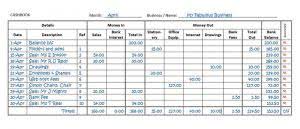
Clergy should carefully document housing expenses to substantiate the exclusion if audited. Churches must provide clear guidance to ensure compliance and maximize this benefit. Explore essential tax guidelines for churches, covering exemptions, income, contributions, and compliance to ensure smooth financial operations. Just because churches are non-profits doesn’t mean there aren’t people on staff. It takes a lot of hard work to run a church and make a difference in the community. With a payroll system designed for the church, managing payroll, deductions, benefits, special clergy allowances, and personal time is easier because it is made with ministries in mind.
Recordkeeping and Reporting
Businesses have very different goals in comparison to churches, particularly when it accounting for churches comes to finances. For religious organizations and non-profits, their goal is to achieve their organization’s mission. Of course, both need revenue to reach their goals, but faith-based entities use it to serve the people around them. By Maintaining designated donor funds the church ensures transparency, accountability and honesty.
- If the church collects money to remodel the main congregational room, via designated fund, they are NOT allowed to use that money to resurface the parking lot.
- We’ll go into further detail about delegating the bookkeeping task later, but it’s worth noting that you should include the four steps listed above in your established bookkeeping process.
- And each church is under the financial laws of the state in which it resides – being run by pastors, its board, and staff.
- Consider giving each category a “monthly” and “annually” column so you can plan ahead for future expenses.
- Proper documentation, such as receipts or bank statements, is required to substantiate deductions.
Specific Regulatory Requirements
- Dedicated accounting software for your church will streamline your processes, reduce accounting errors, and save time on administrative tasks.
- The next time they come and ask for a portable ice cream truck called “Holy Scoops”, you’ll know if the funds are available and whether it qualifies as an expense.
- The best practice would be to do it monthly when you receive your bank statements.
- I have built my accounting spreadsheets using the single entrybookkeeping system outlined above.
- Similar to assets, liabilities are listed in the order they are expected to be settled, with current liabilities appearing first.
- Implementing fund accounting on your statement of financial position and statement of activities will give a clear and precise snapshot of the church’s financial health.
Churches need to make sure they have enough money to do everything they want to do throughout the year. Maintain detailed and accurate records of all financial transactions and cash flow, including donations, expenses, payroll, and grants. Proper documentation of any financial data helps you stay prepared for audits and will help you provide evidence of compliance with regulatory and tax guidelines.

Understanding the Objective of Fundraising: 10 Fundraising Goals for Nonprofit Success
- As a result, fund accounting plays a crucial role in maintaining the trust of donors, stakeholders, and regulatory bodies by providing a clear and accurate picture of an organization’s financial health.
- While one major purpose of this letter is to thank the donor for their contribution, it should also function as a donation receipt.
- The Statement of Financial Position, also known as the Balance Sheet, is a fundamental financial report for nonprofit entities such as churches.
- Think of this as a shortlist to start thinking about how to avoid these mistakes and others.
- There should be a clear chain of command and list of responsibilities for every employee.
- Churches that want to save money and error-proof their accounting via easy-to-use intelligent automations should consider Zoho Books.
Unlike horseshoes where close will gain you points, accounting transactions have no such leeway, it’s either right or wrong. A long-standing accounting principle is to report the ‘cost’ of a fixed asset such as a building. While CPAs could enter appreciation into the accounting ledger they will use a separate sub-account, thus keeping the original cost and appreciation separate. Using two accounts the balance sheet shows the original cost and appreciation on separate lines, providing transparency. For example, if a donation is made toward a special project or missionary organization that your church supports, by law, those funds are only allowed to be used for that specific reason. We pick a local charity to highlight, such as the food bank or pregnancy center.

Statement of Functional Expenses

Proper documentation, such as receipts or bank statements, is required to substantiate deductions. For contributions over $250, retained earnings a written acknowledgment from the organization is mandatory. A church bookkeeper can help you manage everything from simple budgeting to complex compliance concerns.

Your church’s chart of accounts is essentially its financial directory. #11 The bank account should be reconciled by someone not involved with the check writing process. Independent reviews of accounting and payroll reports should be a regular occurrence. Leaders should reconcile payroll reports to salary contracts to make sure that no employees are concealing inflated paychecks through increased tax withholding or Accounting for Churches increasing the frequency of their pay. The person handling payroll or accounting is often the person who is most able to conceal a fraud because of their knowledge.
